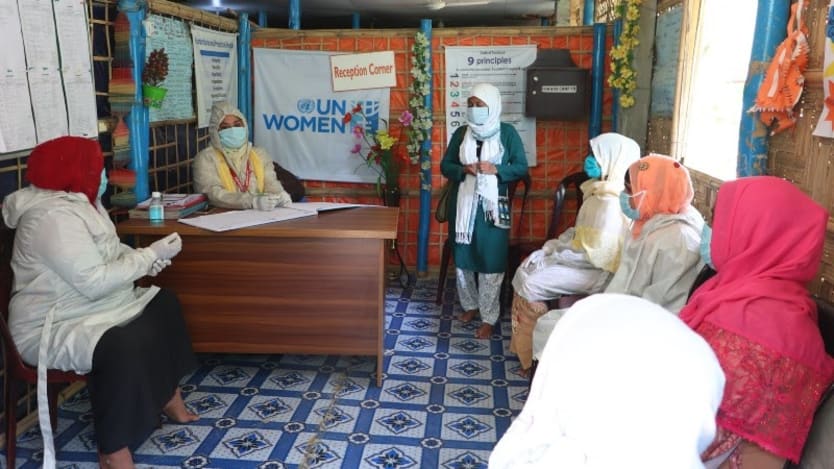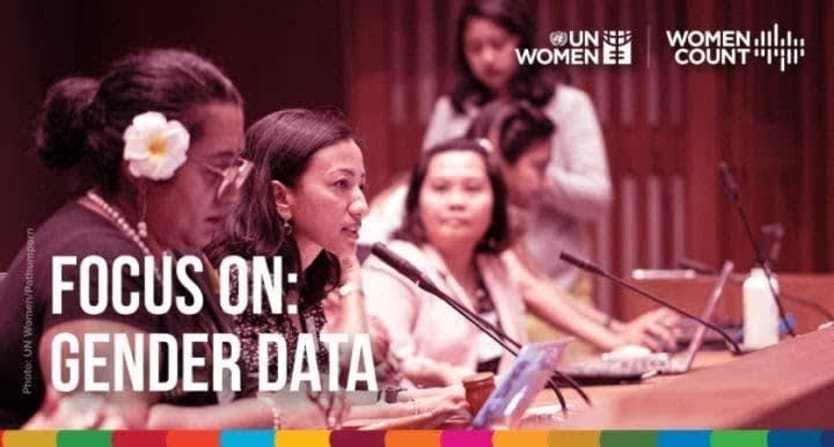
MISSOULA, Mont. — In Bangladesh and Pakistan, women are less likely to receive information about COVID-19 than men, according to early results from surveys conducted by UN Women’s Regional Office for Asia and the Pacific.
In April, UN Women created a new rapid assessment survey tool, partnered with mobile network operators, and began rolling out questionnaires via SMS to capture the pandemic’s gendered consequences throughout the region.
With thousands of respondents already — and with weights applied to adjust for age, sex, and educational attainment — the agency is beginning to better understand how the coronavirus is impacting men and women differently.
“Income is being lost both for men and women, but in the large majority of the forms of income, it's women who are losing more.”
— Sara Duerto Valero, statistics specialist, UN WomenCurrently, preliminary results are available for Bangladesh, Maldives, Pakistan, Thailand, Cambodia, and the Philippines. UN Women sent the survey to between 1 million and 3 million people in each country, to account for an anticipated low response rate, which returned samples of between 2,000 and 5,000. Some of the common findings across countries were expected, such as the fact that women are more likely to see increases in both unpaid domestic and unpaid care work since the spread of COVID-19.
But other results have been surprising, according to Sara Duerto Valero, UN Women statistics specialist based in Bangkok. In the Maldives, evidence suggests that lockdown regulations increased male help with household chores and care responsibilities, for example. Questions about mental health have also revealed “clear gender differentials,” Valero shared.
This article is part of Focus on: Gender Data
This focus area, powered by UN Women, highlights how data is being used to inform policy and advocacy to advance gender equality. Gender data is crucial to make every woman and girl count.
“Also in terms of resources, a lot of our partners we have shared the data with, they have been very interested in the fact that women have not been able to access the help they need. So that's definitely very helpful in terms of framing responses,” Valero said.
Devex spoke with Valero to find out how UN Women was able to collect the data so quickly, what it says about the gendered impacts of COVID-19 so far, and how the agency hopes the data will be used.
This conversation has been edited for length and clarity.
What did you consider when you were thinking about how to quickly collect data about the impact of COVID-19 in the region?
We started thinking about it even before COVID actually spread out through the region because our China office was already very concerned. We knew that the issue was going to be that we cannot do face to face data collection, so we started thinking about other possibilities. Traditionally, because we also work a lot on disaster statistics, surveys are conducted with phone enumerators. But in this case we wanted something a lot quicker than that.
So you built your own tool?
Yes, so what we did is we built our own data collection tool that sits on our server. We didn’t want to use third party tools because we wanted full ownership of the data and no confidentiality issues. So we basically designed our own tool that would allow us to really design the survey in any way we like. And also allow the respondents to input the data directly into our server.
You’re relying on mobile network operators to send out the surveys, right? What has it been like engaging with these new partners?
So it's been really interesting to partner with the private sector because they are much, much quicker than we are in so many ways. Their responses are fast and they're like, “yes, we can do it.” So they send a text message that says, “Hey we — as in whoever the mobile network operator is — are partnering with UN Women to find out how COVID-19 is affecting you. Please help us by filling out the survey,” and the link on the text message redirects the user directly to the questionnaire that can only be accessed if you received the message.
We didn’t want to post the message online or on social media because we wanted full control of the sample. So if we know how many people have received the text messages and roughly the characteristics of these people, then we can actually apply weights to weight our samples to be nationally representative.
I don't think we would have been able to achieve this without [mobile network operators], really. In all the other regions, all the other regional advisors are still trying to run the surveys, but they weren't very successful in engaging mobile network operators, so they don't have the data yet. We were able to deliver these results faster than any other U.N. agency.
Were are any of these questions sensitive? Was there any fear about the safety of respondents?
That’s probably what took us the longest time to design the questionnaire because we had to be mindful that this is an online survey and it’s distributed through text message, so it cannot be long, it cannot be complicated, or there will be high respondent drop out. But also people are stuck at home with their perpetrators for instance, right? So if we ask questions about violence or about some sensitive issues, you know, there's a possibility that this is going to have repercussions. So we did not include any questions around violence precisely for that reason.
What sort of information is able to be captured in this way?
First of all, we asked questions around health — whether people are having trouble accessing doctors, whether people are having trouble accessing hygiene products, and whether people are waiting longer times at the doctor's office to see if there are gender differentials there. And we see that generally there are. Most women in most countries say that they are having more trouble than men accessing hygiene products and medical supplies.
Then we ask questions around mental health and whether this affects people's anxiety and stress. And here we see quite big differentials with women being more likely to say that their mental health is being affected. So obviously women are spending more time at home, they're doing a lot more of the unpaid work. Some of them may be victims of violence. So this affects their mental health.
'Show me the numbers': The forces stalling gender data collection
Money is one — but not the only — challenge when it comes to collecting and producing gender data, female statisticians and other government officials tell Devex.
Then we move on to questions around loss of jobs, loss of livelihoods, changes in income sources. And here again, we see that for all formal workers, there are reductions in the time spent doing work, but the reductions are much bigger for women.
And then, we go directly into loss of income. And the findings for loss of income are also interesting. We see that income is being lost both for men and women, but in the large majority of the forms of income, it's women who are losing more. So income from paid jobs, income from growing foods, income from remittances from friends and family, is dropping dramatically for women.
You plan to survey 10 countries, right? Or more?
Some of the countries that have already run our surveys have reached out to us for a second round. So they would like us to see if things have changed one month later, like if disparities have gotten even bigger or if there's more people unemployed now, or what is happening.
So we might have second rounds both in Bangladesh and the Philippines. And then also in some countries, we're trying a bit of a different approach. In the case of Afghanistan, for instance, we're partnering with IRC to actually collect data among internally displaced people. We wouldn't be reaching them with text messages because a lot of women don't use phones there. So then we are partnering with [IRC] because they are already on the ground and they are sending some enumerators with tablets to ask people to complete the survey in their local languages, then disinfecting the tablets based on households. So yeah, let’s see what that returns.
How do you think groups or governments will use this data to inform their strategy? How much interest has there been?
When we start planning the surveys, we get in touch with our country offices who are working with the national governments in running all the national socio-economic assessments to plan the COVID response.
In most countries, governments are aware that we're running this and in some countries, we're even partnering with national statistics offices, like in the Maldives, for instance, they've been super helpful in promoting response rates. So they're really keen to get the data and use it for planning the policy response.
In many countries, this has been the case. But besides the national governments, we also have [organizations] like the Asian Development Bank who have reached out to us for the data to plan their responses. Also DFID. So yeah, people I would say are really quite keen to see what's out there because as I said, most partners are collecting data but no data is out yet. So everybody is like, OK, we need to respond right away, and this is the data that's out there.
Devex, with support from our partner UN Women, is exploring how data is being used to inform policy and advocacy to advance gender equality. Gender data is crucial to make every woman and girl count. Visit the Focus on: Gender Data page for more. Disclaimer: The views in this article do not necessarily represent the views of UN Women.









